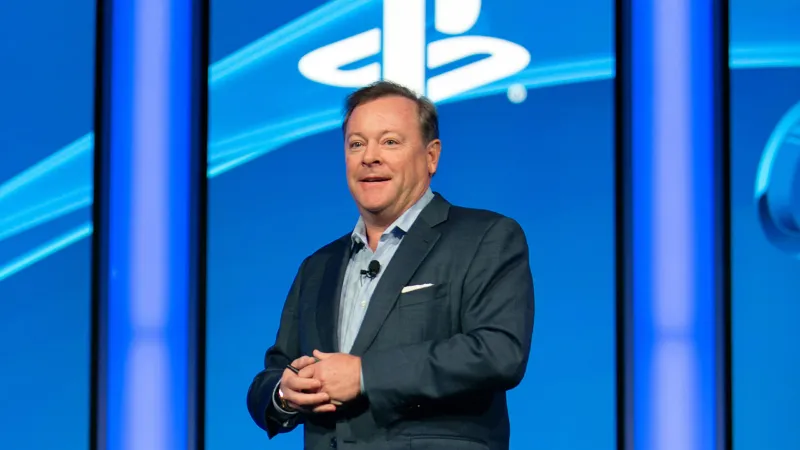
Jack Tretton was the president and CEO of Sony Computer Entertainment America from 2006 to 2014, but his history with the PlayStation brand stretches back to its very beginnings. He joined Sony in 1995 and worked on the team that created its first home console, the PlayStation. Tretton continued his work with the PlayStation team to launch the PlayStation 2, one of the most successful video game consoles of all time, in 2000, and then the PlayStation Portable in 2005 before becoming SCEA’s chief.
As president and CEO of SCEA, he was the face of PlayStation in marketing, on E3 stages, in interviews, and more, especially stateside. His legacy is PlayStation, through and through, but when talking to Tretton, it’s clear he loves all video games – not just the ones PlayStation makes – and the industry surrounding them. When he stepped down from SCEA in 2014, Tretton was nervous and anxious to go out on his own, but he knew it was something he wanted to do.
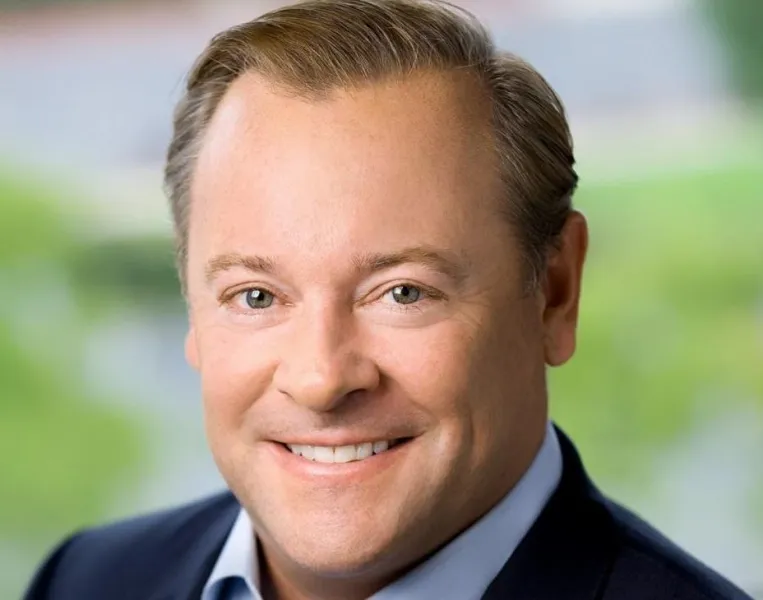
“I was really anxious to go out on my own and kind of pick and choose my partners and pick and choose the things I was excited about because you get exposed to so many great things on the corporate side, but you kind of have to universally love everything they love whether you do down in your heart or not,” Tretton tells Game Informer. “Independently, assuming you’re not chasing a dollar…you can really pick and choose the things that you’re passionate about, and indie game development was certainly, I think, the most exciting thing that’s happened in my career. To go from, 20 or 25 big companies around the world that control 85% of the business in the console space, and the need to have a big company with big budgets and the resources to distribute your games around the world to a brick and mortar retail…[and] with the advent of digital publishing and digital stores, all of a sudden, every creator could become a publisher. To me, that was incredibly exciting.”
From SCEA To SPAC
That excitement led to Tretton becoming the CEO of PowerUp Acquisition Corporation, which includes other industry veterans like former Activision Blizzard vice chairman Bruce Hack, in 2020. PowerUp is a special purpose acquisition company, or SPAC, that looks to play in the behind-the-scenes space of the industry, but in talking with Tretton, PowerUp’s current objective is best defined as: find a studio or publisher and lend to it the experience, support, mentorship, and financial investment behind the team at the company. PowerUp is already a public company, launching a $250 million initial public offering on February 17. PowerUp closed the IPO six days later on February 23, reaching roughly $288 million. Now, Tretton says it is looking to merge with a company that holds a $1-2 billion valuation.
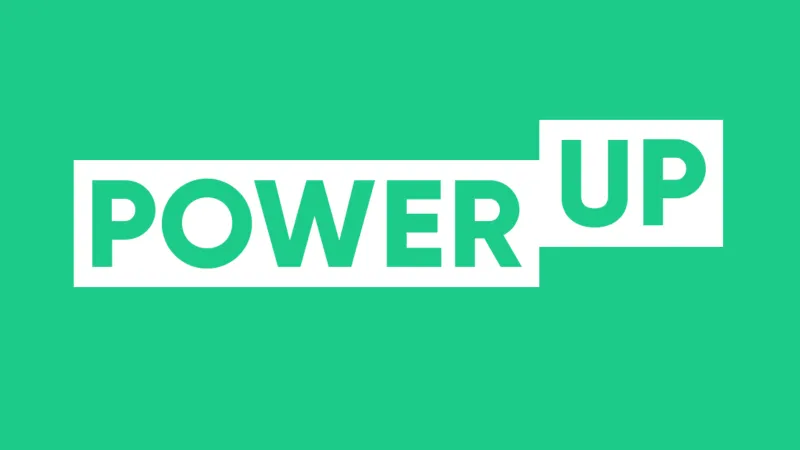
“We already are public so by merging with us, they would become public,” Tretton says. “So we’re giving them access to public markets, as opposed to trying to file an IPO, raise money, and go public on their own. And then obviously, the shareholders would vote on the company that we elect to merge with, and assuming that all goes well, then that public entity is the combination of the two companies, and obviously, we would keep the name of whatever the company is that we merge with.”
Tretton says merging with utility companies, media companies, and other adjacents is a possibility, but due to his background, he’s really pushing for the merge to happen with a publisher or a developer. Citing how big the pond is of this $200 billion industry, Tretton says his bet is that video games are where PowerUp lands, but that really, any company with positive revenue, a competitive market position, and a good vision on how to grow a business down the road would work as a great option for PowerUp.
“By going with us, we can help them raise money and we obviously bring the access to the public markets and we bring our relationships and expertise in growing businesses and raising money specifically in the video game space,” Tretton says. “I think that’s what really makes us unique to…other forms of fundraising or growth.”
While PowerUP is a SPAC, Tretton says the organization is not looking to eat up multiple companies, or even one company, and change entire dynamics. That’s why PowerUP is looking for a developer or publisher that’s already well-established and firing on all cylinders.
“I think we want somebody who’s got a long-term view,” Tretton tells Game Informer. “We’re certainly not going to join this company and walk away from the venture in any way, shape, or form, but we also want to make it crystal clear that we’re not looking to take it over either.”
The Year Of Acquisitions
However, Tretton is fascinated with the acquisitions that have largely defined the gaming landscape in 2022 thus far, both as the CEO of a SPAC and as a former PlayStation boss. It started with Take-Two Interactive, the parent company behind the Grand Theft Auto series, announcing back in January that it was acquiring mobile giant Zynga for nearly $13 billion. Then, a week later, Microsoft announced that it was acquiring Activision Blizzard, the company behind Overwatch and Call of Duty, for a colossal $68.7 billion, and then two weeks later, Sony revealed it was buying Bungie for $3.6 billion. A few weeks after that, Sony announced it had acquired Jade Raymond’s new studio, Haven Studios. Acquisitions continue to happen, as do rumors of additional purchases like these, and Tretton says 2022 is “the most amazing year for acquisitions” he’s ever seen.
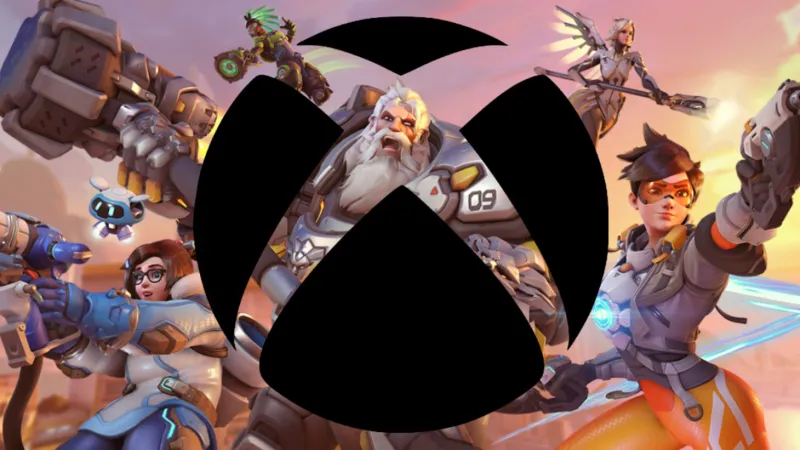
“There’s a way to look at virtually everything that happens as being glass half-full or glass half-empty and you can find ways to come up with negatives about these acquisitions, but I think the positives far outweigh the negatives,” Tretton says. “And the positives are that it brings attention to an industry that’s already $200 billion and growing, and even though it’s more than double the size of the box office and the music industry combined, I still think you find a lot of people out there that don’t appreciate how big and sophisticated and…mainstream entertainment gaming is.”
Tretton says a multi-trillion dollar company like Microsoft purchasing a company like Activision Blizzard for nearly $70 billion is a testament to how big this industry is and how big Microsoft is betting on it. He recognizes the negative, or glass half empty, perspectives on acquisitions happening this year, but overall, they’re good for the industry, he says. Some talk about acquisitions happening between companies like Sony and Microsoft as competitive, as if one company is acquiring in response to another’s acquisition, but Tretton doesn’t see it that way.
He says that back in the day, when PlayStation and Xbox were just starting out, the competition was certainly there. But now, the two have grown to be so big that each is executing its own strategy personalized to its goals.
“I think back in the day, when I was back at Sony and we were trying to establish this PlayStation brand, and Xbox came out and we’re trying to compete with such a formidable company in Microsoft, it very much was ‘win at the expense of the competition, counter what they’re doing, block what they’re doing,’ but I think the businesses have grown so big now that it isn’t that way anymore.”
However, Tretton says Nintendo always followed the beat of its own drum and could never be accused of trying to imitate anybody else. And now, today, Microsoft and Sony could be lumped into the same kind of business mindset, he says. For example, he doesn’t believe Microsoft will make Call of Duty an Xbox exclusive, something he’s confident it would have done had it purchased Activision Blizzard 10 years ago.
He points to Microsoft’s commitment to releasing games on PC, and Sony’s commitment to an extent as well, as an indicator that things are different. He also points to a Sony studio developing MLB The Show, a game that’s no longer exclusive to PlayStation consoles and now released on Xbox consoles and Switch, too. It’s not about keeping your IP solely proprietary to one place anymore – it’s about doing what makes the most sense and helping the bottom line, according to Tretton.
“Rising tides lift all boats,” Tretton says. “The competition in the video game industry is not Nintendo versus Sony versus Xbox. It is video games as an entertainment form against watching TV, going to concerts, whatever other forms of entertainment you have. So the gaming industry is competing for people’s time and mindshare, and the more great entertainment experiences there are, the more that people in the video game business and the people that enjoy playing video games have to choose from.
“I think I would much rather a competitor invest in the video game space than a competitor invest in the movie industry or the music industry because to me, investing in the movie industry isn’t necessarily going to help grow the video game business.”
An Era Of Live Service
Acquisitions have defined 2022, but since Tretton’s departure from PlayStation in 2014, which was the same year Destiny was released, the gaming landscape has been transformed perhaps most drastically by games-as-a-service, otherwise known as live service games. While these types of experiences have been around for quite some time, Bungie’s Destiny popularized the definition most people likely think of when they hear “live service” today. Games like Fortnite have presented their own spins on it, too, introducing battle pass-related microtransactions that have largely overtaken the loot box model, although the controversy surrounding loot boxes and their relation to gambling helped speed that up too. Now, Sony, which has a video game portfolio defined mostly by narrative-driven single-player experiences, is diving headfirst into games-as-a-service. In February, PlayStation revealed plans to launch 10 live services games by 2026, and acquisitions of studios like Bungie and Haven Studios speak directly to that.
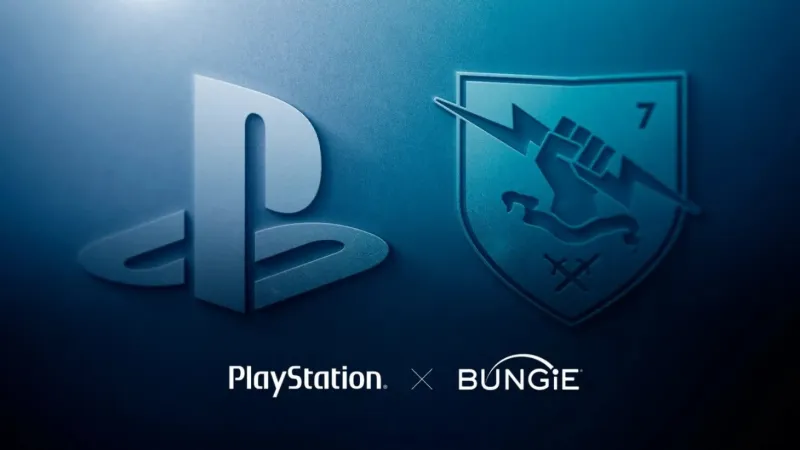
With Tretton leaving PlayStation right as live service games as a genre really began to take off, he said he couldn’t have foreseen PlayStation’s 10-game commitment, but he’s still not surprised. To him, it’s just about whether or not these games turn out to be great experiences.
“I think ultimately, if it’s a great entertainment experience and a great value for the consumer, then it will succeed,” Tretton tells Game Informer. “If it is a money grab, and [if it’s] trying to take old content and make people pay for it, then it won’t. Everybody looks at their entertainment dollar value and whether they’re choosing between an indie game, a major release from a major publisher, whether they’re paying $60 or $30, whether they’re paying a subscription service, it’s all going to come down to how much they enjoy it, how they choose to spend their time, and the amount of entertainment they get per dollar versus other alternatives. One thing that remains constant is there are still only 24 hours in a day, right? So if the value is good, the gamer is going to respond.”
If the value of a PlayStation-developed live-service game is good, Tretton believes the market will respond positively. He says the one thing you need to do as a console maker is find ways to keep your controller in consumer’s hands, and he sees the appeal of live service games in that regard. These types of games are designed to keep you playing, or at least checking in daily, and that’s a win for studios and publishers.
“The more that [console] is left on, the more opportunities that companies have to make money and the more people spend time on it and find joy in it, the more value [publishers] get out of the investment they’ve made,” he says. “There’s this marriage between the consumer and the manufacturer or the publisher that has to exist, where both parties have to be happy, or it doesn’t work out.”
A New Way To Game
Another major talking point in gaming that’s sprung up since Tretton left PlayStation almost a decade ago is cloud gaming. PlayStation Now launched right before his departure and since then, well, it hasn’t really done too much in the discussion of cloud gaming. Sure, there are a lot of PS Now subscribers, but it’s fair to say Microsoft’s more recent expansion to cloud gaming is already a more attractive option than PS Now when comparing the two side-by-side, at least in the zeitgeist. Perhaps Sony will shift the scales a bit when its revamped PlayStation Plus service, which bundles in PS Now, launches this June, but that remains to be seen.
When asked if he thought cloud gaming would become as prominent in games as it is today, Tretton said he always saw the potential but didn’t expect it to happen so fast. He says Sony led the charge with its then-Gaikai purchase while Microsoft took a wait-and-see approach. He doesn’t think Microsoft’s approach hurt it in any way, either.
“If you look back at that time, Sony made a pretty significant investment to get in that business and get a first-mover advantage,” Tretton says. “And Microsoft’s attitude was kind of more of a wait and see, and I guess the fundamental question is, ‘did that investment in early-mover status really benefit Sony? Did it hurt Microsoft?’ I think the reality of the situation is it certainly didn’t hurt Microsoft.”
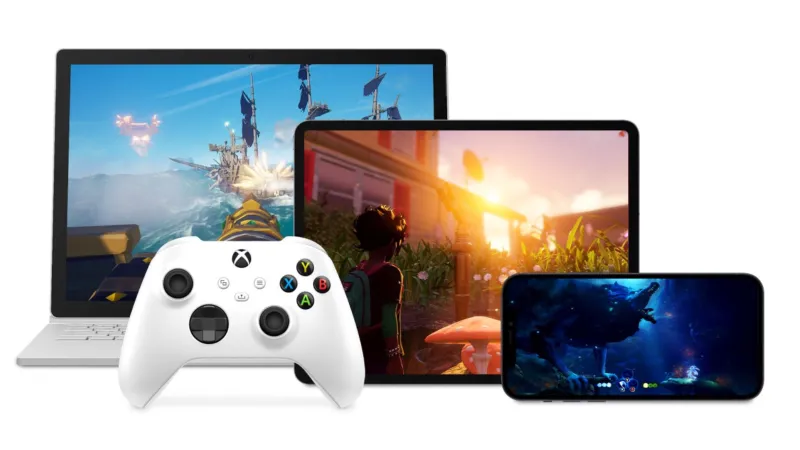
He says he ultimately saw the journey to cloud gaming being a 7 to 10-year journey before it became anything significant at all because he didn’t think the technology was really there during his final years at Sony. However, he recognizes the exponential growth of technology and believes the timing of cloud gaming today to be “pretty good.”
“The experience is getting better for gamers, the value is getting better, and both companies have pretty good offerings,” Tretton says before stating that Nintendo’s own service is getting better too.
Tretton On The Rise And Fall Of E3
In between PowerUp, thoughts about acquisitions, cloud gaming, and more, Tretton says he’s been thinking a lot about E3 and lately, the way it’s seemingly coming to an end. Tretton was the face of Sony at many E3 conferences during his time as SCEA president, and he says it was always one of his favorite parts of the job. He remembers seeing all kinds of expos pop up for this industry and that, and yearning for one focused on video games. When E3 came around in 1995, he was excited, citing that it “felt like it was a real coronation for the industry.”

“It really went through probably a 10-year period where it was really a celebration of the industry and you had major parties with major rock bands performing,” Tretton tells Game Informer. “You had a large amount of press from around the world, not just from the United States going to it, and it certainly didn’t start that way.”
It then swung the other direction, with companies feeling too much money was being spent on the event.
“Then it went to big companies having to mind their bottom line and saying, ‘My god, we’re spending all this money on a trade show to get PR. Do we really need to do an event like this for the press? We want to drive our bottom line and we want to scale back our commitment to E3’ and that was very disappointing to me.”
And the pendulum swung back the other way once more, to a big E3 again, he says.
“That’s when you had the big press conferences between the Microsofts and the Nintendos and all the big publishers, and people were waiting to hear what was going to be announced and what the big news was, and I certainly enjoyed that a great deal,” Tretton tells Game Informer. “It was a massively-stressful event to put on, but it was the marquee event for your company for the year. If you had a good E3 showing, you were going to have a good year, and if you had a bad E3 showing, it was going to be a rough year. It had a lot of pressure on it, but I really enjoyed it.”
Tretton says he doesn’t think E3 is as valuable and as necessary as it has been in the past, but he believes video games need their own marquee event, much like music has The Grammy Awards and movies, The Oscars. Some would argue that Geoff Keighley’s annual show, The Game Awards, has become that. Still, Tretton says if E3 is done for, as many have speculated with E3 2022 canceled altogether, “it’s a loss for the industry and its ability to…really celebrate and trumpet all the innovation and great things that it does so I’d love to see it come back.”
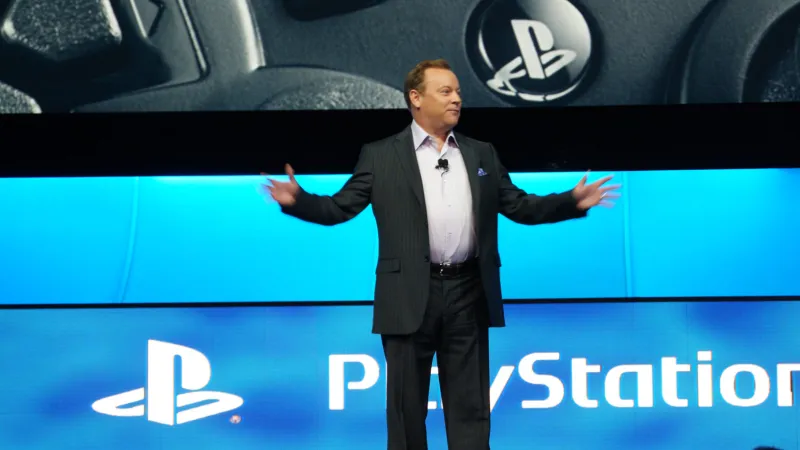
As for where companies are heading today, with many holding their own miniature E3-like conferences, Tretton says the lens you view these approaches determines whether they’re successful or not. If you look at Sony’s State of Plays or Nintendo Directs from a financial viewpoint, you will probably be in favor of these individual showcases. But if you’re someone who’s about marketing, you might be pro-show, like something seen at E3, he says.
“It’s really going to come down to your financial wherewithal and your priority of where you think the brand is at, and whether or not you think you want to do events like that,” Tretton says. “I think you can look at it as an outsider and go, ‘okay, the motivation here is clearly financial.’ Companies get to make those decisions [and] it clearly comes at a financial cost to do an event like that, but it does drive visibility.
“It comes down to whether or not your bottom line can handle it and whether or not your bottom line is your number one priority. I think ultimately, that’s where the decision gets made.”
Source: Game Informer Former PlayStation Boss Jack Tretton On Acquisitions, Live Service Games, E3, His New Company, And More

